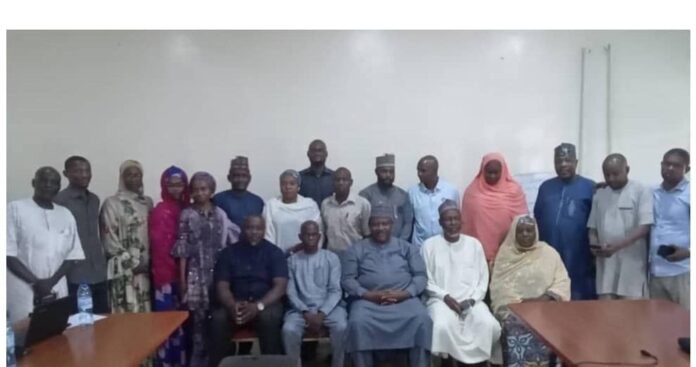By: Babagana Bukar Wakil, Maiduguri
In the heart of conflict-ridden Borno State, where insurgency, displacement, and poverty continue to jeopardize lives, a quiet revolution is taking root one that empowers women, protects families, and holds the promise of a healthier future. The revolution is family planning.
Recently, the Development Communications Network (DevComs) and The Challenge Initiative (TCI), with support from Johns Hopkins Center for Communication Programs, convened a high-level roundtable in Maiduguri. Held at Dujuma International Hotel, the multi-stakeholder meeting brought together public health officials, faith-based leaders, communication specialists, and community mobilizers. Their shared mission to review the ongoing efforts, challenges, and breakthroughs in the state’s Family Planning (FP) and Childbirth Spacing (CBS) programs.
The two-day engagement featured intense deliberations and site visits to primary health centres in Maiduguri, including the One Thousand Housing Estate PHC and Herwa PHC. These excursions allowed stakeholders to interact with frontline providers and clients and to see firsthand the struggles and resilience shaping the FP landscape.
Dr. Yusuf Abubakar, Borno’s State TCI Coordinator, emphasized the critical role of childbirth spacing in enhancing maternal and child health outcomes. “It is no longer a choice but a necessity,” he asserted. “We need stronger collaboration to close the lingering gaps in access, awareness, and service delivery.”
The data backs his urgency. Despite years of insecurity, statistics show a modest but encouraging rise in contraceptive uptake in 2024 fueled by persistent advocacy, localized interventions, and grassroots mobilization.
Dr. Habiba Sa’idu, representing the Borno State Primary Health Care Development Agency (BSPHCDA), provided a sobering view of the state’s current contraceptive prevalence rate. “Young couples between the ages of 15 and 25 are among the most underserved. These are individuals who need our services the most but often lack access or information,” she said. Her recommendation “We must reach them at their doorsteps with empathy and culturally tailored messages.
One of the most promising aspects of the roundtable was the inclusion of faith leaders from both the Jama’atu Izalatul Bid’ah Wa Iqamatus Sunnah (JIBWIS) and the Christian Association of Nigeria (CAN). They offered nuanced perspectives on the intersection of family planning, faith, and social values.
Faith-based resistance has long been cited as a barrier to FP adoption in Nigeria. However, with increasing awareness and dialogue, many religious leaders are beginning to see family planning not as an affront to faith, but as a moral and health imperative. “We’re not preaching against birth, but against suffering,” one cleric said during the session.
The BSPHCDA, with support from UNFPA and TCI, has scaled up its community-based services dramatically. From January 2023 to date, over 731 service providers have been trained on Long-Acting Reversible Contraceptives (LARCs) and Postpartum Family Planning (PPFP). Job aids and demand generation tools are being deployed, simplifying key messages and strengthening community-level advocacy.
Equally impactful is the inauguration of CBS support groups, which now include community health extension workers (CHEWs), district heads, and religious figures from seven Local Government Areas. These groups serve as critical bridges between healthcare providers and hesitant communities.
In a state battered by armed conflict, these support systems are not just medical they are deeply social, and increasingly spiritual.
Despite these gains, stakeholders laid bare the persistent obstacles undermining family planning in Borno. The list is long:
– No budget line for childbirth spacing interventions within the state’s financial framework.
– Chronic stock-outs due to irregular federal supply and the absence of “last mile” distribution mechanisms.
– A glaring shortage of trained FP providers following staff retirements and reassignments.
– Deep reliance on external donor support—without which many programs would stall entirely.
– Insufficient male engagement, despite growing recognition of men as gatekeepers in reproductive health decisions.
Worse still, some LGAs remain inaccessible due to insurgency. Volunteers often brave physical danger just to deliver essential services.
Health advocates are calling for immediate government intervention. They want a dedicated FP budget line, expansion of service points, and improved logistics for commodity delivery. More critically, they emphasize the need to train additional providers and deploy more male advocates to break the cultural stigma around contraception.
TCI’s Borno State Communications Lead. MUSA Waba said “Every woman deserves to decide freely and responsibly the number and spacing of her children. That’s not just policy it’s a human right.”
The efforts of DevComs, TCI, UNFPA, and BSPHCDA are not only keeping the program alive but they are reimagining what is possible in humanitarian health interventions. Their resilience sends a strong message: even in the face of adversity, progress is possible when communities, governments, and partners unite with purpose.
The path ahead may be steep, but the momentum is building. In the words of Dr. Sa’idu: “When commitment meets action, transformation is inevitable.
COV/BBW




